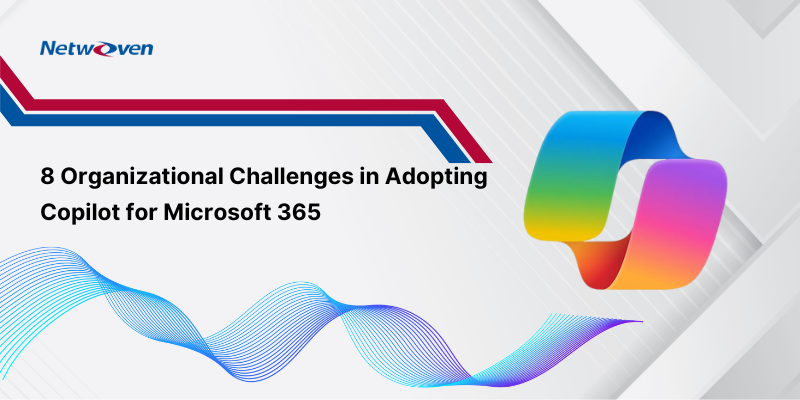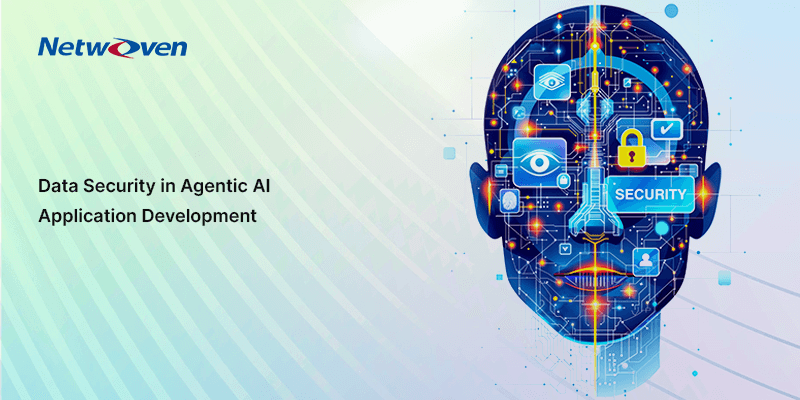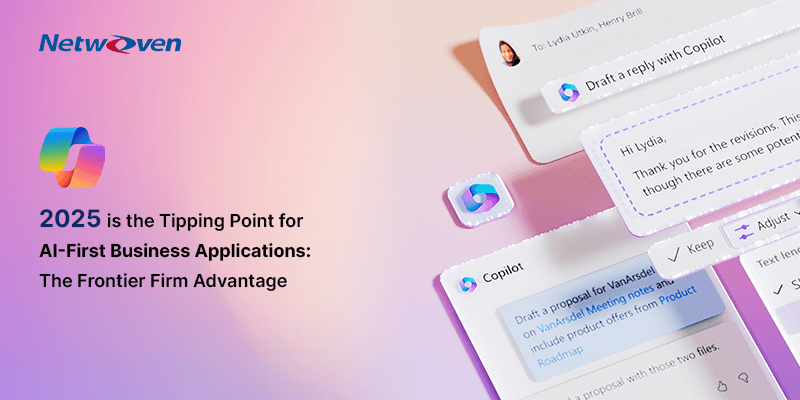Introduction
Hello Netizens!
Ready to plunge into the whirlwind of hype around generative AI and Copilot?
AI advancements are moving at a rapid pace.
On March 16, 2023, Microsoft announced the launch of Microsoft 365 Copilots. This add-on, designed to boost business productivity, quickly became a worldwide sensation. But here is the caveat. Audiences got so hypnotized that they could not look past the glamour and forgot to consider the challenges behind Copilot’s practical implementation.
What Are the Use Cases for Microsoft Copilot?
Microsoft Copilot offers numerous use cases across various industries and departments:
- Enhanced Productivity: Copilot can assist with generating summaries, drafting emails, creating documents, and automating repetitive tasks, significantly boosting individual and team productivity.
- Data Analysis and Reporting: It can quickly analyze large datasets, create visualizations, and generate insights to help organizations make data-driven decisions faster and more efficiently.
- Project Management: Copilot can assist project managers by providing real-time updates, managing schedules, and suggesting next steps based on project progress and data.
- Customer Service: It can help customer service teams respond to queries faster by suggesting responses or providing quick access to relevant information from a company’s knowledge base.
- Sales and Marketing: Copilot can analyze customer data to identify trends, help craft personalized marketing messages, and support sales teams with data-driven insights to enhance customer engagement strategies.
- Compliance and Risk Management: It can assist in monitoring compliance by flagging potential issues based on internal policies and external regulations, and by suggesting steps to mitigate risks.
What Are the Risks of Copilot?
Using Microsoft Copilot carries several risks that organizations should consider:
- Data Privacy and Security: As Copilot accesses and processes sensitive data, there is a risk of data breaches, unauthorized access, or misuse of information. Organizations must ensure robust security measures are in place.
- Inaccurate Outputs: The AI could generate inaccurate, misleading, or irrelevant information if the input data is flawed or misinterpreted, leading to potentially harmful decisions or actions.
- Over-Reliance on AI: Over-dependence on Copilot’s AI-generated insights could diminish critical thinking and decision-making capabilities among employees. Human oversight is essential to validate the recommendations provided by the tool.
- Compliance Risks: Using AI tools like Copilot may expose organizations to regulatory and compliance risks, particularly if the AI’s use conflicts with local laws or industry-specific regulations regarding data handling and storage.
- Bias in Decision-Making: The AI model behind Copilot might inadvertently introduce bias into decision-making processes, especially if the training data contains inherent biases or lacks diversity.
Microsoft Copilot challenges and how to address them
1. Data Security Risks and Precautions
Copilot is trained on a vast dataset of text and code, granting it access to a significant amount of sensitive information. This extensive training enables Copilot to perform a wide range of tasks with remarkable efficiency. However, the same characteristic also introduces considerable privacy and security risks.
Organizations utilizing Copilot must be vigilant in recognizing these potential vulnerabilities. Sensitive data, such as proprietary business information, personal data of employees and customers, and confidential communications, could be at risk of exposure if not properly managed. The implications of a data breach can be severe, including financial loss, legal repercussions, and damage to an organization’s reputation.
2. Navigating Content Management and Data Governance
Many organizations struggle with challenges related to content oversharing and data governance. This can lead to unauthorized access to sensitive information, increasing the risk of data breaches and potential misuse. Without proper data governance, it becomes difficult to track, manage, and protect critical information assets, leading to compliance issues and inefficiencies.
3. Ethical Usage of Copilot
Organizations must remain vigilant about legal considerations, particularly copyright laws, that pertain to the utilization of AI-generated content within their operations. As artificial intelligence becomes increasingly adept at creating content, it’s imperative for businesses to understand the nuanced legal landscape governing its use. Failure to adhere to copyright laws can result in potential litigation.
Furthermore, staying informed about evolving regulations and legal precedents in the realm of AI-generated content is crucial. As technology continues to advance, lawmakers may introduce new legislation or rulings that impact how organizations can utilize AI-generated materials.
4. Access Control and Cost Management
Organizations leveraging Copilot for Microsoft 365, a subscription-based service priced at $30 per user per month, must approach the management of access and costs with diligence and foresight. While the service offers significant potential for enhancing productivity and efficiency, its subscription model necessitates careful oversight to ensure optimal utilization and cost-effectiveness.
Efficient access management is crucial to prevent unauthorized usage and maintain data security. Organizations should implement robust access controls, such as user authentication and role-based permissions, to regulate who can utilize the Copilot service. Additionally, regular audits and monitoring mechanisms can help identify and address any instances of unauthorized access swiftly.
5. Infrastructure Requirements for Proper Copilot Functioning
Copilot relies on specific technical prerequisites for optimal performance, including subscriptions to Microsoft 365 for Business/Business Premium or Microsoft 365 E3/E5, access to OneDrive, an Entra ID and compatibility with the new Outlook client. These requirements form the foundation for seamless integration with existing workflows and collaboration tools within organizations. Additionally, access to the Microsoft 365 and Teams App Store is essential for deploying and managing Copilot effectively. By meeting these prerequisites, organizations can harness the full potential of Copilot to enhance productivity and streamline operations.
6. Employee Training for Copilot Integration in Microsoft 365
Employees will benefit from additional training sessions aimed at enhancing their proficiency in leveraging Copilot for Microsoft 365. This training should encompass various aspects of Copilot’s functionality, including its features, capabilities, and best practices for integration into daily workflows.

A Guide to Unlocking Productivity with Generative AI in the Workplace
This eBook, brought to you by Netwoven, a global leader in Microsoft consulting services, explores into the exciting potential of AI at your workplace within the familiar Microsoft 365 suite.
Get the eBookHands-on exercises and practical demonstrations can help employees gain confidence and competence in using Copilot to streamline tasks, automate processes, and improve productivity within their respective roles. Furthermore, ongoing support and resources should be made available to employees to address any questions or challenges that may arise during the adoption and implementation of Copilot.
7. Developing Skills for Extending Line of Business and External Data Connectivity
Expanding the functionality of Microsoft Copilot through the integration of plug-ins and connectors with Line of Business (LOB) applications or external data sources presents a unique challenge that necessitates the acquisition of new development skills. Unlike out-of-the-box solutions, which may offer pre-built integrations with commonly used software, customizing Copilot to interface with specific LOB systems or external databases demands a deeper understanding of programming languages, APIs, and integration methodologies.
Developers tasked with extending Copilot’s capabilities must possess the technical expertise to design, develop, and deploy custom plug-ins and connectors tailored to the organization’s unique requirements. This may involve proficiency in languages such as JavaScript, Python, or C#, as well as familiarity with relevant frameworks and libraries for building robust integrations.
Furthermore, integrating Copilot with LOB or external data sources requires a nuanced understanding of data structures, security protocols, and compliance considerations. Developers must ensure seamless data transmission and adherence to regulatory requirements while maintaining the integrity and confidentiality of sensitive information.
8. Troubleshooting Errors to Support Copilot Users
Organizations should provide timely support channels for employees encountering Copilot errors, including IT personnel and documentation for troubleshooting. Proactive guidance through training sessions and workshops ensures optimal Copilot utilization, covering functionality, optimization tips, and integration best practices. User-friendly resources like manuals, FAQs, and video tutorials empower self-service for employees navigating Copilot challenges or questions.
Conclusion
As technology races ahead, our awareness can lag, leaving us vulnerable to unforeseen consequences. All it takes is a free risk assessment test, especially when implementing Copilots or any AI technology. If you’re left with questions, don’t hesitate to reach out. We’re here to help you build a responsible AI future.






















